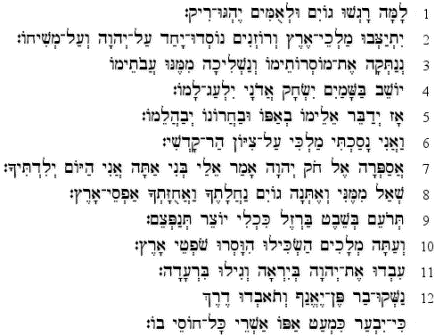 Read Psalm 2
Read Psalm 2
Historically, it is possible that this psalm was used in coronation ceremonies for the installation of a new king. In the psalm itself, the king (David?) is recalling his own coronation, perhaps in a time of trouble.
In verses 1-3 he reports and questions the posture of the surrounding nations and their rulers, who want their liberty from Israel’s rule. But the Lord mocks their pretensions for he has installed his own king upon Zion (vv. 4-6). We should note that verse 4 can be read as a human reflection on the divine response rather than God’s actual attitude toward these foreign rulers. The suggestion of verse 6 is that this is God’s own speech. Verses 7-9 continue this assertion with the direct claim that “He said to me…” The claims of this text are astounding: divine sonship and authority. Such claims were not unusual in the ancient world, and indeed have not been unusual in modern times either: kings not infrequently claim some kind of divine right to establish their rule. In this context, Israel’s king reminds the kings of the nations that he has supremacy by divine right and command, and so warns them to pay homage both to the Lord and to himself (vv. 10-12).
Thus at the historical level, the king reminds himself of the word of promise given to him at his coronation, and rests his assurance in that word. Those who rise up against him challenge the Lord who installed him as king. Surely this is in vain.
This remarkable psalm requires interpretation not only at the historical level, but also as prophetic. Since the earliest days of the church, the psalm has been read as referring to Christ, God’s Anointed, his Messiah (v. 2). In Acts 4:25ff. David is attributed authorship, and Herod and Pilate and even the people of Israel are seen as the nations who rage against God and against his Christ. Acts 13:33, Mark 1:11 and 9:7, and 2 Peter 1:17 all apply verse 7 to Jesus specifically. Revelation 12:5 and 19:15 apply verse 9 to Christ, and in Revelation 2:27, the ascended Jesus promises that his faithful followers will share in his rule of the nations.
It is really not surprising that the early church read verse 7 especially, as a prophetic text with an ultimate reference to Jesus, the divine Son. At the historical level ‘divine sonship’ applied to Israel’s king only metaphorically; to Jesus, it is a description of his true being and relation to God: to the very depths of his being he is the Son. A number of modern translations render verse 12 as “Do homage to the Son,” or “Kiss the Son.” This is an unlikely but perhaps unsurprising translation.
In light of all this, the final verses of the psalm become an invitation to recognise God’s King, the true ruler of the nations to whom all authority has been given, and to submit to his authority with reverence and joy, that is, to Jesus Christ. This is not so much a threat as an opportunity: blessed are all who take refuge in him!